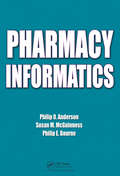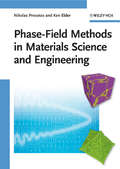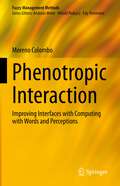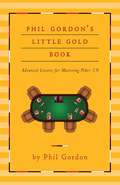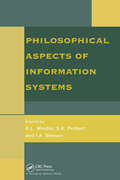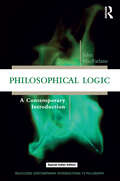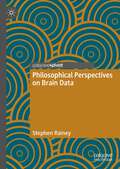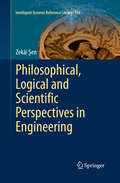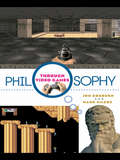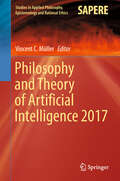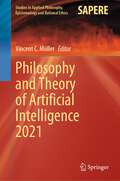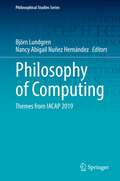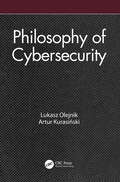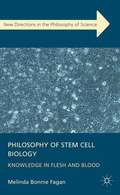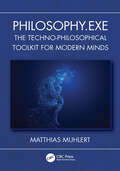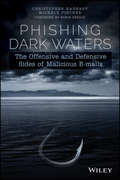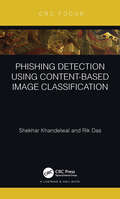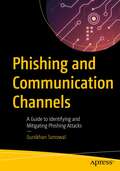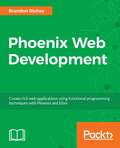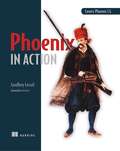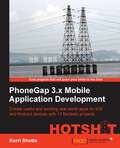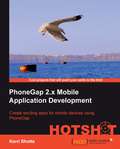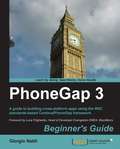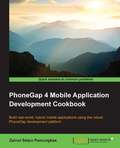- Table View
- List View
Pharmacy Informatics
by Philip E. Bourne Philip O. Anderson Susan M. McGuinnessApplies the Principles of Informatics to the Pharmacy ProfessionEmphasizes Evidence-Based Practice and Quality Improvement ApproachesLeading the way in the integration of information technology with healthcare, Pharmacy Informatics reflects some of the rapid changes that have developed in the pharmacy profession. Written by educators and profession
Phase-Field Methods in Materials Science and Engineering
by Nikolas Provatas Ken ElderThis comprehensive and self-contained, one-stop source discusses phase-field methodology in a fundamental way, explaining advanced numerical techniques for solving phase-field and related continuum-field models.<P><P> It also presents numerical techniques used to simulate various phenomena in a detailed, step-by-step way, such that readers can carry out their own code developments. Features many examples of how the methods explained can be used in materials science and engineering applications.
Phenotropic Interaction: Improving Interfaces with Computing with Words and Perceptions (Fuzzy Management Methods)
by Moreno ColomboSuccessful interaction between humans and artificial systems allows for combining the advantages of all actors in solving problems. However, interaction is often demanding for people, as it builds on artificial concepts, such as strict protocols.This book presents the new paradigm of 'phenotropic' interaction, which aims to improve the naturalness of the interaction thanks to bio-inspired approaches. These include methods for understanding and reasoning with human perceptions expressed as natural language, fundamental to support the artificial system to better understand people's real desires and needs. Methods for improving the theories of computing with words and perceptions are developed in this book and applied to concrete use cases in prototypes enhancing the exchange of information with virtual assistants and smart city ecosystems. The presented use cases serve not only as examples of the application of the phenotropic interaction principles but also to verify their effective impact on communication.
Phil Gordon's Little Gold Book
by Phil GordonSince reigning poker expert Phil Gordon's Little Green Book illuminated the strategies and philosophies necessary to win at No Limit Texas Hold'em, poker has changed quickly and dramatically. Today, Pot Limit Omaha is the game of choice at nosebleed stakes. The players are aggressive, the games are volatile, the decisions are tough, and the pressure is relentless. This is Poker 2.0. In his Little Gold Book, Phil Gordon reexamines the game from the ground up. The key to competing with today's top players is finding the post-flop edge, but to really understand this new playing style, you need to get comfortable with the underlying math. Don't be intimidated. Gordon makes this challenging material as approachable and simple as possible. Beginning with the foundations of Poker 2.0, he unpacks the modern poker player's tool kit, rigorously examines the new lines of play in No Limit Hold'em, dissects the fast and furious strategies of Pot Limit Omaha, and explores the winning poker mind-set that will take your game to an entirely different level. The golden age of poker is upon us. Phil Gordon's Little Gold Book will shorten your learning curve, and if you're willing to put in the time and the work, big bankrolls await.
Philosophical Issues In Information Systems
by R. L. Winder S. K. Probert I. A. BeesonThis ground-breaking book represents the work of a variety of researchers in information systems that share a common concern to use philosophical approaches to help solve problems in information systems. It brings together many of the leading researchers in the field and provides a broad-based range of chapters addressing key contemporary issues in the field. It looks at philosophical and social implications of the development of IS, relates these issues to the role IS plays in contemporary business and cultural theory, and discussed IS in a social and philosophical context, rather than simply as technology.
Philosophical Logic: A Contemporary Introduction (Routledge Contemporary Introductions to Philosophy)
by John MacFarlaneIntroductory logic is generally taught as a straightforward technical discipline. In this book, John MacFarlane helps the reader think about the limitations of, presuppositions of, and alternatives to classical first-order predicate logic, making this an ideal introduction to philosophical logic for any student who already has completed an introductory logic course. The book explores the following questions. Are there quantificational idioms that cannot be expressed with the familiar universal and existential quantifiers? How can logic be extended to capture modal notions like necessity and obligation? Does the material conditional adequately capture the meaning of 'if'—and if not, what are the alternatives? Should logical consequence be understood in terms of models or in terms of proofs? Can one intelligibly question the validity of basic logical principles like Modus Ponens or Double Negation Elimination? Is the fact that classical logic validates the inference from a contradiction to anything a flaw, and if so, how can logic be modified to repair it? How, exactly, is logic related to reasoning? Must classical logic be revised in order to be applied to vague language, and if so how? Each chapter is organized around suggested readings and includes exercises designed to deepen the reader's understanding. Key Features: An integrated treatment of the technical and philosophical issues comprising philosophical logic Designed to serve students taking only one course in logic beyond the introductory level Provides tools and concepts necessary to understand work in many areas of analytic philosophy Includes exercises, suggested readings, and suggestions for further exploration in each chapter
Philosophical Logic: A Contemporary Introduction (Routledge Contemporary Introductions to Philosophy)
by John MacFarlaneIntroductory logic is generally taught as a straightforward technical discipline. In this book, John MacFarlane helps the reader think about the limitations of, presuppositions of, and alternatives to classical first-order predicate logic, making this an ideal introduction to philosophical logic for any student who already has completed an introductory logic course.The book explores the following questions. Are there quantificational idioms that cannot be expressed with the familiar universal and existential quantifiers? How can logic be extended to capture modal notions like necessity and obligation? Does the material conditional adequately capture the meaning of 'if'—and if not, what are the alternatives? Should logical consequence be understood in terms of models or in terms of proofs? Can one intelligibly question the validity of basic logical principles like Modus Ponens or Double Negation Elimination? Is the fact that classical logic validates the inference from a contradiction to anything a flaw, and if so, how can logic be modified to repair it? How, exactly, is logic related to reasoning? Must classical logic be revised in order to be applied to vague language, and if so how? Each chapter is organized around suggested readings and includes exercises designed to deepen the reader's understanding.Key Features: An integrated treatment of the technical and philosophical issues comprising philosophical logic Designed to serve students taking only one course in logic beyond the introductory level Provides tools and concepts necessary to understand work in many areas of analytic philosophy Includes exercises, suggested readings, and suggestions for further exploration in each chapter
Philosophical Perspectives on Brain Data
by Stephen RaineyWhere there is data there are questions of ownership, leaks, and worries about misuse. When what’s at stake is data on our brains, the stakes are high. This book brings together philosophical analysis and neuroscientific insights to develop an account of ‘brain data’: what it is, how it is used, and how we ought to take care of it. Emerging trends in neuroscience appear to make mental activity legible, through sophisticated processing of signals recorded from the brain. This can include Artificial Intelligence (AI), with algorithms classifying brain signals for further processing. These developments will have ramifications for concepts of the brain, the self, and the mind. They will also affect clinical practices like psychiatry, by modifying concepts of mental health and introducing AI-based diagnostic and treatment strategies. The issues arising are vastly complicated, little understood, but of high importance. Philosophical Perspectives on Brain Data clarifies complex intersections of philosophical and neuroscientific interest, presenting an account of brain data that is comprehensible. This account can be the basis for evaluating practices based on brain data. As such, the book aims to open a novel space for evaluating hitherto arcane areas of academic research in order to provide the necessary scope for understanding their real-world consequences. These consequences will include personal, socio-political, and public health dimensions. It is therefore vital that they are understood if their impacts upon aspects of everyday life can be evaluated adequately.
Philosophical, Logical and Scientific Perspectives in Engineering
by Zekâi ŞenThis book highlights and explains the significance of philosophical, logical, and scientific principles for engineering education/training and engineering works. In so doing, it aims to help to rectify the neglect of philosophy and logic in current education and training programs, which emphasize analytical and numerical methods at the expense of the innovative practical and creative abilities so important for engineering in the past. Individual chapters examine the relation of philosophy, logic, and science to engineering, drawing attention to, for example, the significance of ethics, the relevance of the philosophy of science, and the increasing importance of application of fuzzy logic to engineering. Modeling principles and philosophy in engineering are discussed, and the impact of different education systems, examined. Too often engineers have become reliant on readily available formulations and software; this book offers an antidote, promoting the recognition of artistic and humanitarian aspects and their integration in engineering works.
Philosophy Through Video Games
by Jon Cogburn Mark SilcoxHow can Wii Sports teach us about metaphysics?Can playing World of Warcraft lead to greater self-consciousness?How can we learn about aesthetics, ethics and divine attributes fromZork, Grand Theft Auto, and Civilization?A variety of increasingly sophisticated video games are rapidly overtaking books, films, and television as America's most popular form of media entertainment. It is estimated that by 2011 over 30 percent of US households will own a Wii console - about the same percentage that owned a television in 1953. In Philosophy Through Video Games, Jon Cogburn and Mark Silcox - philosophers with game industry experience - investigate the aesthetic appeal of video games, their effect on our morals, the insights they give us into our understanding of perceptual knowledge, personal identity, artificial intelligence, and the very meaning of life itself, arguing that video games are popular precisely because they engage with longstanding philosophical problems.Topics covered include:* The Problem of the External World* Dualism and Personal Identity* Artificial and Human Intelligence in the Philosophy of Mind* The Idea of Interactive Art* The Moral Effects of Video Games* Games and God's GoodnessGames discussed include:Madden Football, Wii Sports, Guitar Hero, World of Warcraft, Sims Online, Second Life, Baldur's Gate, Knights of the Old Republic, Elder Scrolls, Zork, EverQuest Doom, Halo 2, Grand Theft Auto, Civilization, Mortal Kombat, Rome: Total War, Black and White, Aidyn Chronicles
Philosophy and Theory of Artificial Intelligence 2017 (Studies in Applied Philosophy, Epistemology and Rational Ethics #44)
by Vincent C. MüllerThis book reports on the results of the third edition of the premier conference in the field of philosophy of artificial intelligence, PT-AI 2017, held on November 4 - 5, 2017 at the University of Leeds, UK. It covers: advanced knowledge on key AI concepts, including complexity, computation, creativity, embodiment, representation and superintelligence; cutting-edge ethical issues, such as the AI impact on human dignity and society, responsibilities and rights of machines, as well as AI threats to humanity and AI safety; and cutting-edge developments in techniques to achieve AI, including machine learning, neural networks, dynamical systems. The book also discusses important applications of AI, including big data analytics, expert systems, cognitive architectures, and robotics. It offers a timely, yet very comprehensive snapshot of what is going on in the field of AI, especially at the interfaces between philosophy, cognitive science, ethics and computing.
Philosophy and Theory of Artificial Intelligence 2021 (Studies in Applied Philosophy, Epistemology and Rational Ethics #63)
by Vincent C. MüllerThis book gathers contributions from the fourth edition of the Conference on "Philosophy and Theory of Artificial Intelligence" (PT-AI), held on 27-28th of September 2021 at Chalmers University of Technology, in Gothenburg, Sweden. It covers topics at the interface between philosophy, cognitive science, ethics and computing. It discusses advanced theories fostering the understanding of human cognition, human autonomy, dignity and morality, and the development of corresponding artificial cognitive structures, analyzing important aspects of the relationship between humans and AI systems, including the ethics of AI. This book offers a thought-provoking snapshot of what is currently going on, and what are the main challenges, in the multidisciplinary field of the philosophy of artificial intelligence.
Philosophy of Computing: Themes from IACAP 2019 (Philosophical Studies Series #143)
by Björn Lundgren Nancy Abigail Nuñez HernándezThis book features a unique selection of works presented at the 2019 annual international conference of the International Association for Computing and Philosophy (IACAP). Every contribution has been peer-reviewed, revised, and extended. The included chapters are thematically diverse; topics include epistemology, dynamic epistemic logic, topology, philosophy of science and computation, game theory and abductive inferences, automated reasoning and mathematical proofs, computer simulations, scientific modelling, applied ethics, pedagogy, human-robot interactions, and big data, algorithms, and artificial intelligence.The volume is a testament to the value of interdisciplinary approaches to the computational and informational turn. We live in a time of tremendous development, which requires rigorous reflection on the philosophical nature of these technologies and how they are changing the world. How can we understand these technologies? How do these technologies change our understanding of the world? And how do these technologies affect our place as humans in the world? These questions, and more, are addressed in this volume which is of interest to philosophers, engineers, and computer scientists alike.
Philosophy of Cybersecurity
by Lukasz Olejnik Artur KurasińskiTechnology and digitization are a great social good. But they also involve risks and threats. Cybersecurity is not just a matter of data or computer security; cybersecurity is about the security of society. Why "Philosophy"? To understand how to reason and think about threats and cybersecurity in today’s and tomorrow’s world, this book is necessary to equip readers with awareness. Philosophy of Cybersecurity is about the user’s perspective, but also about system issues. This is a book for everyone—a wide audience. Experts, academic lecturers, as well as students of technical fields such as computer science and social sciences will find the content interesting. This includes areas like international relations, diplomacy, strategy, and security studies. Cybersecurity is also a matter of state strategy and policy. The clarity and selection of broad material presented here may make this book the first book on cybersecurity you’ll understand. It considers such detailed basics as, for example, what a good password is and, more importantly, why it is considered so today. But the book is also about systemic issues, such as healthcare cybersecurity (challenges, why is it so difficult to secure, could people die as a result of cyberattacks?), critical infrastructure (can a cyberattack destroy elements of a power system?), and States (have they already been hacked?). Cyberspace is not a "grey zone" without rules. This book logically explains what cyberwar is, whether it threatens us, and under what circumstances cyberattacks could lead to war. The chapter on cyberwar is relevant because of the war in Ukraine. The problem of cyberwar in the war in Ukraine is analytically and expertly explained. The rank and importance of these activities are explained, also against the background of broader military activities. The approach we propose treats cybersecurity very broadly. This book discusses technology, but also ranges to international law, diplomacy, military, and security matters, as they pertain to conflicts, geopolitics, political science, and international relations.
Philosophy of Stem Cell Biology
by Melinda Bonnie FaganThis examination of stem cell biology from a philosophy of science perspective clarifies the field's central concept, the stem cell, as well as its aims, methods, models, explanations and evidential challenges. Relations to systems biology and clinical medicine are also discussed.
Philosophy.exe: The Techno-Philosophical Toolkit for Modern Minds (Security, Audit and Leadership Series)
by Matthias MuhlertWe live in an age of unprecedented complexity, where technology, cognitive biases, and societal systems shape our decisions in ways we barely notice. The world is changing faster than our ability to make sense of it. Philosophy.exe is designed to bridge this gap, offering a mental toolkit to help navigate uncertainty, rethink assumptions, and make better decisions in a tech-driven world.Blending classical philosophy, cognitive science, AI ethics, and behavioral psychology, this book provides an adaptive framework for understanding the world. It challenges over-simplified models and rigid ideologies, encouraging readers to embrace complexity as a strategic advantage rather than a threat.What This Book Explores· Complexity Thinking – Why linear logic fails and how to develop a mindset that thrives in uncertainty.· Cognitive Biases & Decision-Making – How hidden mental shortcuts shape our beliefs, and how to counteract them.· Resilience & Mental Adaptability – Tools for maintaining clarity, focus, and critical thinking in a rapidly evolving landscape.· Technology & Human Autonomy – The philosophical and ethical challenges of AI, digital identity, and algorithmic decision-making.· Ethics Beyond Intentions – A pragmatic approach to decision-making that accounts for unintended consequences.Philosophy.exe is for those who seek to go beyond conventional wisdom—whether philosophers, strategists, leaders, or curious minds who question the narratives shaping modern life. It provides the tools to think deeply, adapt quickly, and engage critically in an era dominated by complexity and rapid technological evolution.In a world of misinformation, automation, and uncertainty, this book isn’t just about philosophy—it’s about survival.
Phishing Dark Waters
by Christopher Hadnagy Michele Fincher Robin DreekeAn essential anti-phishing desk reference for anyone with an email address Phishing Dark Waters addresses the growing and continuing scourge of phishing emails, and provides actionable defensive techniques and tools to help you steer clear of malicious emails. Phishing is analyzed from the viewpoint of human decision-making and the impact of deliberate influence and manipulation on the recipient. With expert guidance, this book provides insight into the financial, corporate espionage, nation state, and identity theft goals of the attackers, and teaches you how to spot a spoofed e-mail or cloned website. Included are detailed examples of high profile breaches at Target, RSA, Coca Cola, and the AP, as well as an examination of sample scams including the Nigerian 419, financial themes, and post high-profile event attacks. Learn how to protect yourself and your organization using anti-phishing tools, and how to create your own phish to use as part of a security awareness program. Phishing is a social engineering technique through email that deceives users into taking an action that is not in their best interest, but usually with the goal of disclosing information or installing malware on the victim's computer. Phishing Dark Waters explains the phishing process and techniques, and the defenses available to keep scammers at bay. Learn what a phish is, and the deceptive ways they've been used Understand decision-making, and the sneaky ways phishers reel you in Recognize different types of phish, and know what to do when you catch one Use phishing as part of your security awareness program for heightened protection Attempts to deal with the growing number of phishing incidents include legislation, user training, public awareness, and technical security, but phishing still exploits the natural way humans respond to certain situations. Phishing Dark Waters is an indispensible guide to recognizing and blocking the phish, keeping you, your organization, and your finances safe.
Phishing Detection Using Content-Based Image Classification
by Rik Das Shekhar KhandelwalPhishing Detection Using Content-Based Image Classification is an invaluable resource for any deep learning and cybersecurity professional and scholar trying to solve various cybersecurity tasks using new age technologies like Deep Learning and Computer Vision. With various rule-based phishing detection techniques at play which can be bypassed by phishers, this book provides a step-by-step approach to solve this problem using Computer Vision and Deep Learning techniques with significant accuracy. The book offers comprehensive coverage of the most essential topics, including: Programmatically reading and manipulating image data Extracting relevant features from images Building statistical models using image features Using state-of-the-art Deep Learning models for feature extraction Build a robust phishing detection tool even with less data Dimensionality reduction techniques Class imbalance treatment Feature Fusion techniques Building performance metrics for multi-class classification task Another unique aspect of this book is it comes with a completely reproducible code base developed by the author and shared via python notebooks for quick launch and running capabilities. They can be leveraged for further enhancing the provided models using new advancement in the field of computer vision and more advanced algorithms.
Phishing and Communication Channels: A Guide to Identifying and Mitigating Phishing Attacks
by Gunikhan SonowalMitigate the dangers posed by phishing activities, a common cybercrime carried out through email attacks. This book details tools and techniques to protect against phishing in various communication channels. The aim of phishing is to fraudulently obtain sensitive credentials such as passwords, usernames, or social security numbers by impersonating a trustworthy entity in a digital communication. Phishing attacks have increased exponentially in recent years, and target all categories of web users, leading to huge financial losses to consumers and businesses. According to Verizon’s 2020 Data Breach Investigations Report (DBIR), 22% of all breaches in 2019 involved phishing. And 65% of organizations in the USA experience a successful phishing attack. This book discusses the various forms of phishing attacks, the communications most often used to carry out attacks, the devices used in the attacks, and the methods used to protect individuals and organizations from phishing attacks.What You Will Learn Understand various forms of phishing attacks, including deceptive, DNS-based, search engine, and contents injection phishingKnow which communications are most commonly used, including email, SMS, voice, blog, wifi, and moreBe familiar with phishing kits (what they are) and how security experts utilize them to improve user awarenessBe aware of the techniques that attackers most commonly use to request informationMaster the best solutions (including educational, legal, technical) to protect against phishing attacks Who This Book Is For Security professionals who need to educate online users, especially those who deal with banks, online stores, payment systems, governments organizations, social networks and blogs, IT companies, telecommunications companies, and others. The secondary audience includes researchers working to develop novel strategies to fight against phishing activities and undergraduate and graduate instructors of cybersecurity.
Phoenix Web Development: Create rich web applications using functional programming techniques with Phoenix and Elixir
by Mike Voloz Brandon RicheyLearn to build a high-performance functional prototype of a voting web application from scratch using Elixir and PhoenixKey FeaturesBuild a strong foundation in Functional-Programming techniques while learning to build compelling web applicationsUnderstand the Elixir Concurrency and parallelization model to build high-performing blazingly fast applicationsLearn to test, debug and deploy your web applications using Phoenix frameworkBook DescriptionPhoenix is a modern web development framework that is used to build API’s and web applications. It is built on Elixir and runs on Erlang VM which makes it much faster than other options. With Elixir and Phoenix, you build your application the right way, ready to scale and ready for the increasing demands of real-time web applications.This book covers the basics of the Phoenix web framework, showing you how to build a community voting application, and is divided into three parts. In the first part, you will be introduced to Phoenix and Elixir and understand the core terminologies that are used to describe them. You will also learn to build controller pages, store and retrieve data, add users to your app pages and protect your database. In the second section you will be able to reinforce your knowledge of architecting real time applications in phoenix and not only debug these applications but also diagnose issues in them. In the third and final section you will have the complete understanding of deploying and running the phoenix application and should be comfortable to make your first application releaseBy the end of this book, you'll have a strong grasp of all of the core fundamentals of the Phoenix framework, and will have built a full production-ready web application from scratch.What you will learnLearn Phoenix Framework fundamentals and v1.3's new application structureBuild real-time applications with channels and presenceUtilize GenServers and other OTP fundamentals to keep an application stableTrack users as they sign in and out of chat with Phoenix’s built-in presence functionalityWrite your own database interaction code that is safe, bug-free, and easy to work withExplore testing and debugging methodologies to understand a real software development lifecycle for a Phoenix applicationDeploy and run your Phoenix application in productionWho this book is forThis book is for people with a basic knowledge of Elixir, who want to start building web applications. Prior experience with web technologies is assumed.
Phoenix in Action
by Geoffrey LesselSummaryPhoenix is a modern web framework built for the Elixir programming language. Elegant, fault-tolerant, and performant, Phoenix is as easy to use as Rails and as rock-solid as Elixir's Erlang-based foundation. Phoenix in Action builds on your existing web dev skills, teaching you the unique benefits of Phoenix along with just enough Elixir to get the job done.Foreword by Sasa Juric, author of Elixir in Action, Second Edition.Purchase of the print book includes a free eBook in PDF, Kindle, and ePub formats from Manning Publications.About the TechnologyModern web applications need to be efficient to develop, lightning fast, and unfailingly reliable. Phoenix, a web framework for the Elixir programming language, delivers on all counts. Elegant and intuitive, Phoenix radically simplifies the dev process. Built for concurrency, Phoenix channels make short work of developing real-time applications. And as for reliability, Phoenix apps run on the battle-tested Erlang VM, so they're rock solid!About the BookPhoenix in Action is an example-based book that teaches you to build production-quality web apps. You'll handle business logic, database interactions, and app designs as you progressively create an online auction site. As you go, you'll build everything from the core components to the real-time user interactions where Phoenix really shines.What's insideFunctional programming in a web environmentAn introduction to Elixir Database interactions with EctoReal-time communication with channelsAbout the ReaderFor web developers familiar with a framework like Rails or ASP.NET. No experience with Elixir or Phoenix required.About the AuthorGeoffrey Lessel is a seasoned web developer who speaks and blogs about Elixir and Phoenix.Table of ContentsPART 1 - GETTING STARTEDRide the PhoenixIntro to ElixirA little Phoenix overviewPART 2 - DIVING IN DEEPPhoenix is not your applicationElixir application structureBring in PhoenixMaking changes with Ecto.ChangesetTransforming data in your browserPlugs, assigns, and dealing with session dataAssociating records and accepting bidsPART 3 - THOSE IMPORTANT EXTRASUsing Phoenix channels for real-time communicationBuilding an APITesting in Elixir and Phoenix
PhoneGap 2.x Mobile Application Development Hotshot
by Kerri ShottsThis book is a step-by-step guide about how to create a mobile app. Each chapter begins with the design of the user interface using wireframes as well as the data models using various diagrams. After the design, the chapter moves on to the implementation of the app, describing each block of code, including how it works and why it is needed in the context of the project. At the end of each project, various suggestions are proposed to help extend or enhance the project in order to stimulate your creativity and programming skills If you are a developer looking to create a mobile app using HTML, CSS, and JavaScript, this book is for you. While this book should be approachable for anyone looking to create mobile apps using PhoneGap, you should have some degree of experience using HTML, CSS, and JavaScript. You should also be able to create the basic PhoneGap project in the IDE of your choice (XCode, Eclipse, or Visual Studio). Understanding Java, C#, or Objective C is not required.
PhoneGap 2.x Mobile Application Development Hotshot
by Kerri ShottsThis book is a step-by-step guide about how to create a mobile app. Each chapter begins with the design of the user interface using wireframes as well as the data models using various diagrams. After the design, the chapter moves on to the implementation of the app, describing each block of code, including how it works and why it is needed in the context of the project. At the end of each project, various suggestions are proposed to help extend or enhance the project in order to stimulate your creativity and programming skills If you are a developer looking to create a mobile app using HTML, CSS, and JavaScript, this book is for you. While this book should be approachable for anyone looking to create mobile apps using PhoneGap, you should have some degree of experience using HTML, CSS, and JavaScript. You should also be able to create the basic PhoneGap project in the IDE of your choice (XCode, Eclipse, or Visual Studio). Understanding Java, C#, or Objective C is not required.
PhoneGap 3 Beginner's Guide
by Giorgio NatiliWritten in a friendly, example-driven Beginner's Guide format, there are plenty of step-by-step instructions to help you get started with PhoneGap.If you are a web developer or mobile application developer interested in an examples-based approach to learning mobile application development basics with PhoneGap, then this book is for you.
PhoneGap 4 Mobile Application Development Cookbook
by Zainul Setyo PamungkasIf you are a developer who wants to get started with mobile application development using PhoneGap, then this book is for you. Previous experience with data mining libraries will help, but is not mandatory. A basic understanding of web technologies such as HTML, CSS, and JavaScript is a must.
